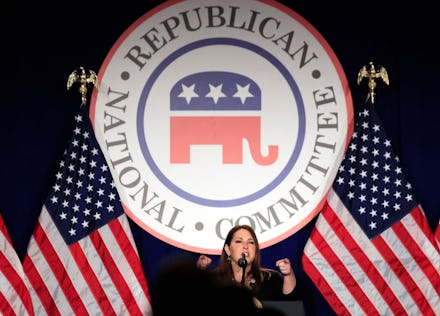Is the Democratic convention still happening?

There’s no bigger event on the political calendar than the party conventions. Every four years, these extravagant gatherings bring political heavyweights and adoring crowds together to watch the Republicans and Democrats officially crown their respective candidates. Tens of thousands jam into arenas to soak up stilted speeches from mid-tier party mandarins and arbitrary celebrities (empty chair sometimes included) — and finally, the nominees themselves. The events typically last around four days, involve tens of thousands of people, require titanic expenditures on pageantry, and generate voluminous fundraising jackpots. They are exactly the kind of event you’d expect an American political party to throw: bombastic, expensive, occasionally captivating, and often very sketchy at the margins.
This year, however, all of that will probably change. Coronavirus has disrupted plans in every dimension of public life on Earth, and there’s no reason to expect that the conventions will be spared. So far, the political parties have claimed that they will be proceeding as normal, although Democrats have pushed their event back from July to August in the hope that the virus may have receded by then.
As of now, Republicans plan to move “full-steam ahead” with their convention, according to Republican National Committee Chairwoman Ronna McDaniel. On a call with reporters, McDaniel said, "We are full-steam ahead planning a traditional convention, working with our team on the ground, [2020 Republican National Convention CEO] Marcia Lee Kelly, to conduct a traditional convention. We do not think at this time we have to switch to an alternative plan, but of course, we will monitor circumstances and adjust accordingly," per CNN.
She noted that contingencies will be planned for, however. "We don't build out our convention until July. So I think we have at least until the end of June or early July to make a decision if we have to switch from a traditional convention to something scaled back. But we will have to have an in-person convention. Those are the bylaws of the RNC and so currently, going forward, we're planning on a full-scale convention," she said.
"I just don't see any way you can do it. Americans can have short memories, but not that short."
Reading between the lines, it seems the party is clearly weighing its options and preparing for the worst. Even if state economies have officially re-opened by August, it’s unlikely that tens of thousands of people will want to crowd into a room with the threat of the virus looming over them. Because party bylaws demand an in-person convention, as McDaniel noted, the Republicans may well have to resort to a pro forma meeting of just party officials quickly meeting in a conference room to certify their nominee if coronavirus renders any type of larger gathering impossible.
In an interview with U.S. News & World Report, lawyer Tom Rath, a New Hampshire Republican who has served as a delegate for nine previous GOP conventions, doubted that a traditional event would take place. "I can't imagine it. These are cattle calls, and everything is jammed, sidewalks are jammed," he said. "I just don't see any way you can do it. Americans can have short memories, but not that short."
The Democrats are in a similar bind. While the party is officially planning a normal convention, party bigwigs are apparently preparing for something much smaller in scale. The Milwaukee Journal Sentinel reported that the Democratic committee for the convention has cut its staff in half through layoffs and transfers. “We’re obviously in regular touch with both federal, state, and local officials. We are planning and hoping for the best, but planning for every eventuality and safety will always be paramount in planning the convention,” said Democratic National Committee Chairman Tom Perez on a call with reporters in March.
Just this week, Perez echoed that optimism. "We moved the convention back five weeks because we thought that would enhance the chances of having a robust, in-person convention," he told reporters on a call. "We are going to put on a convention in Milwaukee that is safe, that's exciting, that's Wisconsiny, that highlights our values and highlights our nominee. And we're going to talk a lot about health care at this convention."
Speaking with U.S. News, Rep. Gerry Connolly, a Virginia Democrat who has previously been a superdelegate at the convention, expects a shortened event.
"Certainly, if the convention were to go forward, my guess is it will go forward in a truncated way," he said. "Even if there is an end to the strict self-quarantining going on right now, the question is, will people by August feel comfortable congregating again?"
In a sense, the parties are playing a game of chicken with each other. Neither wants to be the only one to cancel, only to have the coronavirus threat recede and have given the other side the chance to have the only party in town. On the other hand, both entities seem to understand the risks of moving forward. And in the showy world of the political convention, one question may reign above all: What could be more embarrassing than if a party were to throw a convention, and nobody came?